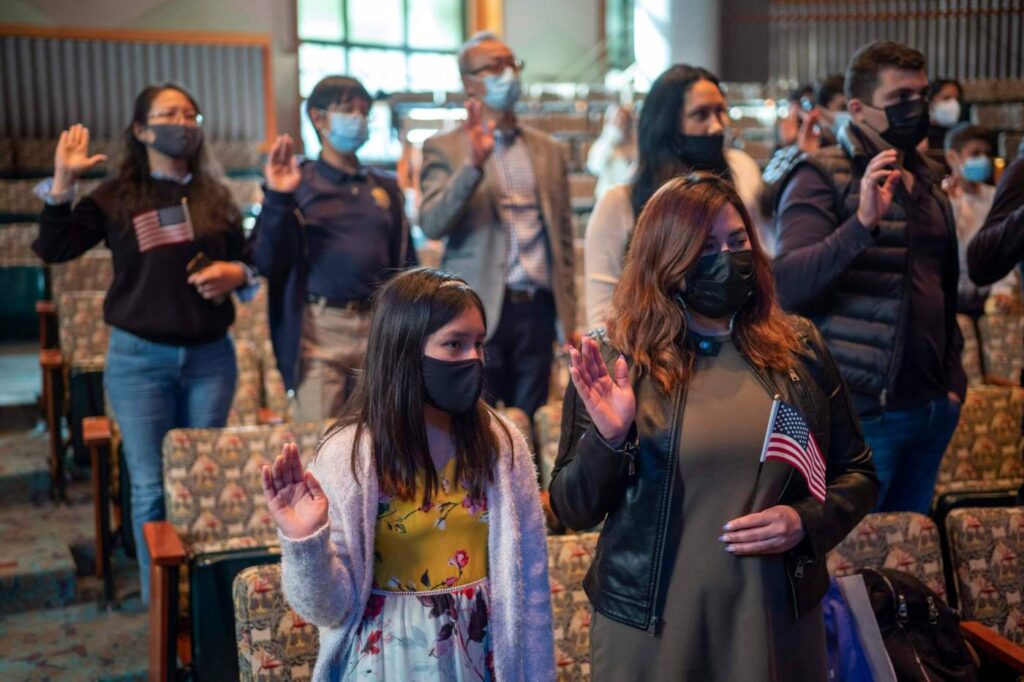
The lines between American citizens and immigrants who live here, legally or not, just became a bit more blurred.
The less distinct those lines, the less motivation immigrants have to learn American history and values while working toward full citizenship.
The trend toward eliminating differences between citizens and others began in earnest in 2015, when California began giving undocumented immigrants the ability to get drivers licenses. These don’t look precisely like the ones carried by citizens, but differences are slight.
About a year later, in late 2016, San Francisco voters passed a measure allowing non-citizens to vote in local school board elections if they are parents of pupils in the district. Since then, thousands of the undocumented, mostly Latinos and Filipinos, have used their new right and the school board took a strong turn to the left.
Then, last year, Gov. Gavin Newsom removed more distinctions by making government-paid health care under the Medi-Cal program an entitlement for everyone living in California, no matter their immigration status.
Yet another big move in the blurring came early this year, when a new law began allowing anyone who can legally work in California to become a police officer, regardless of citizenship.
Related: California bill proposes offering state IDs to all, regardless of immigration status
So green cards became even more vital and the significance of citizenship drooped a little more.
One reason for the latest change, said Democratic state Sen. Nancy Skinner of Berkeley, who carried the bill allowing non-citizen cops, was to equalize professions. “Almost every other profession – lawyers, doctors, even firefighters – are able to be part of that profession as long as they have full legal work authorization,” she told a reporter. “It was only our sworn officers we restricted.”
Of course, only police have the authority to arrest persons and jail them, a major distinction between cops and the other professions Skinner named.
Skinner said the University of California’s police department reached out to her for the change. She said that department’s chief testified in a legislative hearing that UC had turned away “a lot of stellar candidates” with green cards over the citizenship issue.
It’s also true that police departments across California are finding it difficult to recruit new officers in the post-Covid era.
Said an official of the San Diego Police Department, “(We) have lost over 500 officers since July 2020. That’s drastic. We need everyone we can to be able to be a police officer. However, we are not in favor of…reducing the standards.”
Related: No, California won’t automatically register illegal immigrants to vote
The California moves are part of a national trend playing out mostly in states led by Democratic politicians.
Just after New York Mayor Eric Adams took office in January of last year, he endorsed a local measure letting non-citizens vote in all New York City elections. Adams, elected six months earlier, did not touch on the subject until he actually assumed office, perhaps because he won only after a tight Democratic primary election in mid-2021.
The trend actually began just after the turn of this century, when Chicago and a few cities in Maryland began letting non-citizens vote in local elections.
Related: Push to allow non-citizens to vote begins to spread
The rationale all along has been that non-citizens, regardless of immigration status, are usually taxpayers and a significant part of the fabric of the communities where they live.
As Adams said on his inauguration day, “I believe that all New Yorkers should have a say in their government…I look forward to bringing millions more into the democratic process.”
But so far, no non-citizens have been legally permitted to vote in presidential or other federal and statewide elections since 1926, when during a wave of anti-immigrant sentiment, Arkansas became the last state to ban that practice.
Letting non-citizens vote in some elections may be as noble an idea as Adams said, but some of the recent moves have been expensive. California is spending about $2 billion this year on expanded Medi-Cal eligibility, and there was no move to cut the practice from the deficit-ridden budget for the next fiscal year.
Meanwhile, anything that removes incentive to seek citizenship will ultimately hinder both assimilating immigrants and helping them advance, because citizenship remains necessary for many jobs and to move forward in American society.
Email Thomas Elias at tdelias@aol.com.
Related Articles
GOP should resist the urge to go overboard on Hunter Biden. Public knows they just want payback.
Judge Andrew Napolitano: The surveillance state tramples our Fourth Amendment rights
RIP Daniel Ellsberg, a true American hero
Central Valley subsidence and flooding are the next threat to high-speed rail
Trump indictment: Letters
